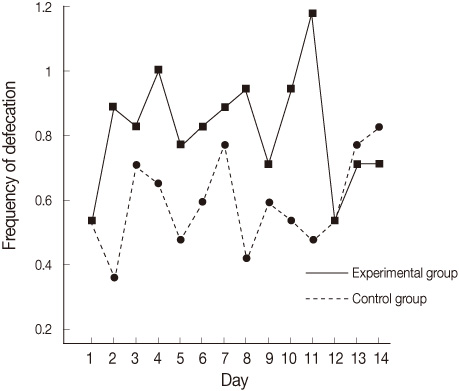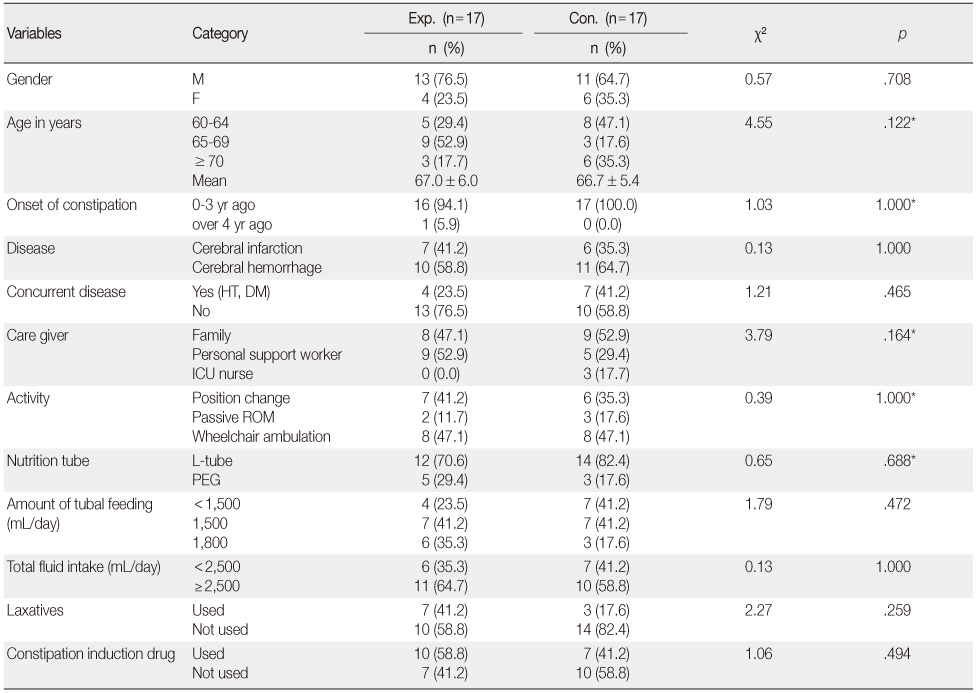Articles
- Page Path
- HOME > J Korean Acad Nurs > Volume 41(2); 2011 > Article
-
Original Article
- Effects of Carbonated Water Intake on Constipation in Elderly Patients Following a Cerebrovascular Accident
- Jae-Hee Mun, Seong Sook Jun
-
Journal of Korean Academy of Nursing 2011;41(2):269-275.
DOI: https://doi.org/10.4040/jkan.2011.41.2.269
Published online: April 30, 2011
1Project Manager, Medical Department, Sillajen Co., Ltd., Busan, Korea.
2Professor, College of Nursing, Pusan National University, Yangsan, Korea.
- Address reprint requests to: Jun, Seong Sook. College of Nursing, Pusan National University, Beomeo-ri, Mulgeum-eup, Yangsan 626-870, Korea. Tel: +82-51-510-8359, Fax: +82-51-510-8308, jss@pusan.ac.kr
© 2011 Korean Society of Nursing Science
Abstract
-
Purpose
- This study was done to identify effects of carbonated water intake on constipation in elders who have experienced a cerebrovascular accident (CVA) and are bed-ridden.
-
Methods
- Forty elderly patients with CVA were randomly assigned to one of two groups in a double-blind study. Patients in the experimental group drank carbonated water and those in the control group drank tap water for two weeks. Six patients dropped out during the study period. Data were analyzed by repeated measured ANCOVA and the covariance was the dose of laxatives used for the two weeks.
-
Results
- Frequency of defecation increased significantly and symptoms of constipation decreased significantly for patients in the experimental group.
-
Conclusion
- The study results suggest that the intake of carbonated water is an effective method for the intervention of constipation in elderly patients with CVA.
This article is a condensed form of the first author's master's thesis from Pusan National University
- 1. Aydogdu I, Ertekin C, Tarlaci S, Turman B, Kiylioglu N, Secil Y. Dysphagia in lateral medullary infarction (Wallenberg's Syndrome): An acute disconnection syndrome in premotor neurons related to swallowing activity. Stroke. 2001;32:2081–2087.ArticlePubMed
- 2. Bae SS, Choi JW, Lee KH, Kim JS, Kim SM, Kim BJ, et al. Diagnosis and treatment of connective tissue massage. Journal of Korean Society of Physical Therapy. 2002;14:231–239.
- 3. Charles HK, Marion EA. Level of classification performance of KESS (symptom scoring system for constipation) validated in a prospective series of 105 patients. Diseases of the Colon & Rectum. 2002;45:1419–1426.
- 4. Choi JY. Effects of a constipation intervention program on inpatient's defecation. Journal of Korean Academy of Nursing. 2004;34:72–80.ArticlePubMedPDF
- 5. Choi JY, Kim HO. A comparison of side effects according to the nutritional methods in the naso-gastric nutrition patients. Korean Nurse. 2001;40:64–79.
- 6. Choi KW, Roe IH, Jhon MS. The therapeutic effect of the alkaline ionized water in the patients with chronic idiopathic constipation. The Korean Journal of Gastroenterology. 1990;22:802–808.
- 7. Cuomo R, Grasso R, Sarnelli G, Capuano G, Nicolai E, Nardone G, et al. Effects of carbonated water on functional dyspepsia and constipation. European Journal of Gastroenterology & Hepatology. 2002;14:991–999.Article
- 8. Hwa WC. Effects of abdominal meridian massage on the constipation of CVA patients. 2004;Pusan National University, Busan. Unpublished master's thesis.
- 9. Jeong SY, Jung HM. The effects of abdominal meridian massage on constipation among CVA patients. Journal of Korean Academy of Nursing. 2005;35:135–142.ArticlePubMedPDF
- 10. Kim DS, Choi IJ, Hwa WC, Lee HZ, Park NH. The effect of abdominal meridian massage on constipation and depression of hemiplegic patients. Clinical Nursing Research. 2004;10:70–81.
- 11. Kim JY, Kim OY, Yoo HJ, Kim TI, Kim WH, Yoon YD, et al. Effects of fiber supplements on functional constipation. The Korean Journal of Nutrition. 2006;39:35–43.
- 12. Kim MJ, Park HS, Choi SH, Song KA, Kim HS, Nam JJ, et al. Fundamentals of nursing. 2005;Seoul, Hyunmunsa.
- 13. Knowles CH, Dinning PG, Pescatori M, Rintala R, Rosen H. Surgical management of constipation. Neurogastroenterology and Motility. 2009;21:62–71.ArticlePubMed
- 14. Knowles CH, Eccersley AJ, Scott SM, Walker SM, Reeves B, Lunniss PJ. Linear discriminant analysis of symptoms in patient with chronic constipation: Validation of a new scoring system (KESS). Diseases of the Colon and Rectum. 2000;4:1419–1426.
- 15. Lee IJ. A study on the factors affecting late-life disability. 2010;Retrieved December 30, 2010. Seoul, Korea Institute for Health and Social Affairs. from http://www.kihasa.re.kr/html/jsp/public/public_02_02_view.jsp?aid=61&ano=3.
- 16. McMillan SC, Williams FA. Validity and reliability of the constipation assessment scale. Cancer Nursing. 1989;12:183–188.ArticlePubMed
- 17. Nam GW, Bae SS, Lee HO, Kim SM. A study on therapeutic approach of constipation with connective tissue massage. Journal of Korean Society of Physical Therapy. 2000;12:475–489.
- 18. Otegbayo JA, Talabi OA, Akere A, Owolabi MO, Owolabi LF, Oguntoye OO. Gastrointestinal complications in stroke survivors. Tropical gastroenterology. 2006;27:127–130.PubMed
- 19. Park UC. Biofeedback therapy in patients with functional evacuation disorders. Journal of the Korean Society of Coloproctology. 2003;19:260–269.
- 20. Pouderoux P, Friedman N, Shirazi P, Ringelstein JG, Keshavarzian A. Effect of carbonated water on gastric emptying and intragastric meal distribution. Digestive Diseases and Sciences. 1997;42:34–39.ArticlePubMedPDF
- 21. Shin JR. Effects of yogurt drinking on defecation improving and relationships between constipation and lifestyle including dietary habit in female college students. 2003;Daejon, Chungnam National University. Unpublished master's thesis.
- 22. Song MS, Ha YS, Yoo SJ, Park YH. Geriatric nursing. 2006;Seoul, Seoul National University Press.
- 23. Thompson WG, Longstreth GF, Drossman DA, Heaton KW, Irvine EJ, Müller-Lissner SA. Functional bowel disorders and functional abdominal pain. Gut. 1999;45:II43–II47.ArticlePubMedPMC
REFERENCES
Figure & Data
REFERENCES
Citations

- Conservative, physical and surgical interventions for managing faecal incontinence and constipation in adults with central neurological diseases
Claire L Todd, Eugenie E Johnson, Fiona Stewart, Sheila A Wallace, Andrew Bryant, Sue Woodward, Christine Norton
Cochrane Database of Systematic Reviews.2024;[Epub] CrossRef - Peak-Frequency Histogram Similarity of Bowel Sounds for the Evaluation of Intestinal Conditions
Takeyuki Haraguchi, Takahiro Emoto, Takahiro Hirayama, Yuki Imai, Masahiro Kato, Tomoya Hirano
Applied Sciences.2023; 13(3): 1405. CrossRef - Magnesium Sulfate-Rich Natural Mineral Waters in the Treatment of Functional Constipation–A Review
Christophe Dupont, Guillaume Hébert
Nutrients.2020; 12(7): 2052. CrossRef - CTQ derived using the new Module device convergence and QFD can be mounted on the dominance Products : Focusing on the sparkling water purifier Case
In-Cheol Song, Dong-Ryong Hwang, Seung-Hee Lee
Journal of Digital Convergence.2015; 13(5): 195. CrossRef - Effects of Awareness and Knowledge of Carbonated Water on Consumption Pattern and Satisfaction among College Students
Hyun Ji Kim, Jae Seon Jang, Myung Sun Hong, Hwa Jeong Seo
The Korean Journal of Food And Nutrition.2015; 28(4): 702. CrossRef - Management of faecal incontinence and constipation in adults with central neurological diseases
Maureen Coggrave, Christine Norton, June D Cody
Cochrane Database of Systematic Reviews.2014;[Epub] CrossRef

Figure 1
Homogeneity Test for General Characteristics between Groups
*Fisher exact test. PEG=Percutaneous endoscopic gastrostomy; HT=Hypertension; DM=Diabetes mellitus; ICU=Intensive care unit; ROM=Range of movement; Exp.=experimental group; Con.=control group.
Homogeneity Test for Outcome Variables between Groups
Exp.=experimental group; Con.=control group.
Comparison of Frequency of Defecation per Week between Groups
*F-value of ANCOVA with pre-test values as covariate.
Exp.=experimental group; Con.=control group.
Comparison of Constipation Symptom between Groups
*F-value of ANCOVA with pre-test values as covariate.
Exp.=experimental group; Con.=control group.
*Fisher exact test. PEG=Percutaneous endoscopic gastrostomy; HT=Hypertension; DM=Diabetes mellitus; ICU=Intensive care unit; ROM=Range of movement; Exp.=experimental group; Con.=control group.
Exp.=experimental group; Con.=control group.
*F-value of ANCOVA with pre-test values as covariate. Exp.=experimental group; Con.=control group.
*F-value of ANCOVA with pre-test values as covariate. Exp.=experimental group; Con.=control group.
 KSNS
KSNS
 E-SUBMISSION
E-SUBMISSION





 Cite
Cite

